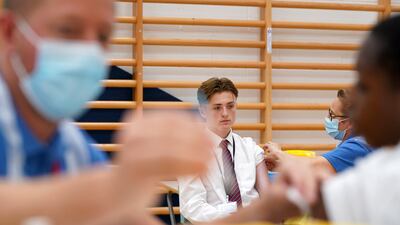Adolescents are driving the transmission of Covid infections in Britain, the country’s chief medical officer has said.
Prof Chris Whitty also said half of England's children aged 12 to 15 had either had Covid-19 or carried the coronavirus without experiencing symptoms.
He told the governmental Commons Education Committee that the remaining children in the cohort would almost certainly catch the virus.
Prof Whitty, who is a medical doctor and epidemiologist, was giving evidence before MPs at a time when pupils aged 12 to 15 are receiving the Pfizer-BioNTech vaccine at school.
Asked whether it was necessary to inoculate children of that age, he said: “There is definitely substantial transmission happening in this age group.
”In fact, the age group we’re talking about is the one in which the highest rates transmission is currently occurring.”
He said the vaccination programme in schools would “reduce significantly” the impact a Covid surge would have.

“Our view is firmly that people who have an infection are likely to be off school for longer than people with a vaccination. Virtually any child unvaccinated is likely to get an infection, at some point, between 12 and 15. That’s a key point.”
The vaccine would reduce the risks of children becoming infected and further reduce the risks of disruption in schools, he said.
“While this is not going to be a silver bullet, it would significantly reduce double the amount of disruption.”
There would also be “fewer days lost as a result” compared with the outcome of “allowing people to be infected” he said.
The programme would reduce by about 110,000 the days lost if there was no vaccination, and “12 million days of schooling will be lost if we were to have a significant surge over winter”, he said.
He agreed with the estimate that 50 per cent of the three million children aged 12 to 15 had already had some form of Covid.
“That’s half over the period of the entire epidemic to date, and we’ve got quite a way to run. We’re running into winter, so there’s quite still quite a lot of damage that could be done to in terms of disruption.”
He produced figures that showed the benefits of child vaccination. It is estimated that every one million doses will prevent 87 admissions to hospital, 58 cases of paediatric inflammatory multisystem syndrome, up to 17 cases of myocarditis heart inflammation and two intensive care admissions. There are also very rare cases of myocarditis caused by the vaccine, he said.
The dose was also up to 70 per cent effective against infection and transmission for children aged 12 to 15.
Prof Whitty said it was vital to vaccinate children living in the poorest areas.
“Those are the areas where the greatest educational advantages are had from people being in schools, and where families are least able to support children at home because they may be doing jobs which don’t allow them to work from home,” he said.
The uptake among 18-year-olds had been “very high”, and more than half of those aged 17 and 16 had chosen to be inoculated so far.
“In the UK, people fully see the impact of Covid and people are choosing to vaccinate,” Prof Whitty said.


